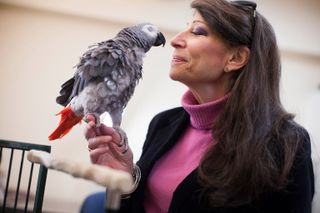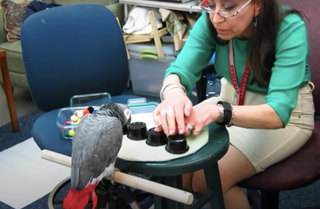This parrot beat 21 Harvard students in a classic memory game
Give this bird a scholarship, please.

African grey parrots (Psittacus erithacus) can live more than 50 years, memorize dozens of words in English and, if given the chance, outsmart a flock of Harvard students in a classic Shell Game.
Well, one grey parrot can, anyway. His name is Griffin, and he is the subject of a recent study published May 6 in the journal Scientific Reports. Researchers challenged Griffin to a working memory task where he had to locate a colorful pom-pom hidden under a plastic cup after it was shuffled around a table several times (aka, the Shell Game). Meanwhile, 21 Harvard students were given the same task — and Griffin matched or outperformed them in 12 of 14 trials.
"Think about it: Grey parrot outperforms Harvard undergrads. That's pretty freaking awesome," lead study author Hrag Pailian, a postdoctoral fellow at Harvard, told The Harvard Gazette. "We had students concentrating in engineering, pre-meds, this, that, seniors, and he just kicked their butts."
To be fair, Griffin is not your average parrot. According to the study authors, the 22-year-old bird "has been the subject of cognitive and communicative studies … since his acquisition from a breeder at 7.5 weeks of age."
Griffin's handler and bird-mom, Irene Pepperberg — a Harvard psychologist and co-author of the new paper — previously taught the parrot to reproduce some 30 English words and to comprehend at least 40, including the names of colors. As such, Griffin didn't need any special coaching to learn the Shell Game — Pepperberg merely demonstrated a few sample rounds for him, just as she did for Griffin's human competitors.

Besides the Harvard undergrads, 21 young kids (ages 6 to 8 years old) also participated in the Shell Game. All adult participants (human and avian) completed 120 rounds of the game (the kids did 36) spread across 14 trials, which got progressively harder as the day progressed. At first, the participants were asked to memorize the positions of just two pom-poms hidden under two cups, which were never moved. By the end of the day, the participants had to keep track of four different-colored pom-poms under four cups, which were shuffled four times. Following the shuffling, participants were shown a pom-pom from a separate pile and asked to find the matching color beneath the cups.
Griffin was able to find the target pom-pom with higher accuracy than the children in all 14 trials. When the Harvard students' performance started to slip in trials of three pom-poms shuffled three or four times, Griffin continued to hit his targets 100% of the time. Only at the end of the day, when four pom-poms were shuffled three or four times, did Griffin's accuracy finally drop. (The students also saw a significant decline in accuracy, though not quite as much as Griffin’s).
Sign up for the Live Science daily newsletter now
Get the world’s most fascinating discoveries delivered straight to your inbox.
What does this bird-brain study tell us about the power of cognition? According to the researchers, both the parrot and the human participants were using a feature of their working memories called "manipulation" to succeed in these tasks. Not only were they able to remember which pom-poms were under which cups once they were out of view, but they were then able to manipulate that information as the cups were shuffled around. The fact that a parrot performed on-par with 42 human competitors suggests that manipulation is an evolutionarily ancient capability, which may have existed in a common ancestor millions of years ago.
Despite being bested by a bird, the Harvard students will go on to enjoy all the privileges an Ivy-league education has to offer them. Griffin, for his part, was rewarded with some raw cashew crackers, the researchers wrote.
Originally published on Live Science.

Brandon is the space/physics editor at Live Science. His writing has appeared in The Washington Post, Reader's Digest, CBS.com, the Richard Dawkins Foundation website and other outlets. He holds a bachelor's degree in creative writing from the University of Arizona, with minors in journalism and media arts. He enjoys writing most about space, geoscience and the mysteries of the universe.
Most Popular

